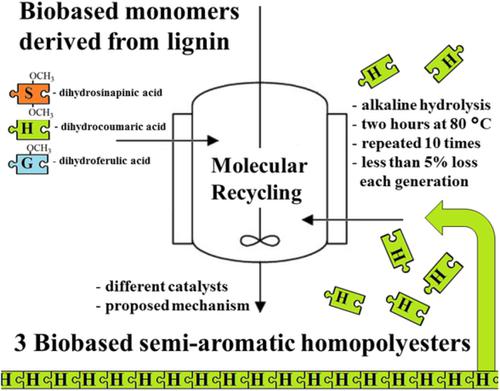当前位置:
X-MOL 学术
›
J. Polym. Sci.
›
论文详情
Our official English website, www.x-mol.net, welcomes your feedback! (Note: you will need to create a separate account there.)
Repeatable molecularly recyclable semi‐aromatic polyesters derived from lignin
Journal of Polymer Science ( IF 3.4 ) Pub Date : 2020-05-23 , DOI: 10.1002/pol.20200088 Jack Schijndel 1, 2 , Dennis Molendijk 1 , Koen Beurden 1 , Romy Vermeulen 1 , Timothy Noël 3 , Jan Meuldijk 2
Journal of Polymer Science ( IF 3.4 ) Pub Date : 2020-05-23 , DOI: 10.1002/pol.20200088 Jack Schijndel 1, 2 , Dennis Molendijk 1 , Koen Beurden 1 , Romy Vermeulen 1 , Timothy Noël 3 , Jan Meuldijk 2
Affiliation

|
The design of molecularly recyclable polymers contributes to a possible solution to the end‐of‐use issue of polymeric materials and gives a closed‐loop approach toward a circular materials economy. The biobased semi‐aromatic polyesters (e.g., poly(phloretic acid), poly(dihydroferulic acid), and poly(dihydro‐sinapinic acid)), described in this paper, can be derived entirely from biomass (mainly lignin). The described polyesters exhibit thermal properties similar to those of certain commodity polymeric materials. These polyesters with ligno‐phytochemicals as monomer have so far demonstrated complete and almost infinite molecular recyclability with a loss of total mass less than 5% per cycle. Moreover, molecular weight and thermal properties (Tg, Tm, and Tcryst) of the tenth generation polymeric material are identical to those of the first generation.
中文翻译:

衍生自木质素的可重复分子回收的半芳族聚酯
分子可回收聚合物的设计有助于解决聚合物材料的最终使用问题,并为循环材料的经济性提供了一种闭环方法。本文所述的生物基半芳族聚酯(例如,聚(乙酸),聚(二氢阿魏酸)和聚(二氢-芥子酸))可以完全源自生物质(主要是木质素)。所述聚酯表现出与某些商品聚合物材料相似的热性能。迄今为止,这些以木质植物化学物质为单体的聚酯已证明具有完全和几乎无限的分子可回收性,每个循环的总质量损失小于5%。此外,分子量和热性能(T g,T m和第十代聚合物材料的T cryst)与第一代聚合物材料的相同。
更新日期:2020-05-23
中文翻译:

衍生自木质素的可重复分子回收的半芳族聚酯
分子可回收聚合物的设计有助于解决聚合物材料的最终使用问题,并为循环材料的经济性提供了一种闭环方法。本文所述的生物基半芳族聚酯(例如,聚(乙酸),聚(二氢阿魏酸)和聚(二氢-芥子酸))可以完全源自生物质(主要是木质素)。所述聚酯表现出与某些商品聚合物材料相似的热性能。迄今为止,这些以木质植物化学物质为单体的聚酯已证明具有完全和几乎无限的分子可回收性,每个循环的总质量损失小于5%。此外,分子量和热性能(T g,T m和第十代聚合物材料的T cryst)与第一代聚合物材料的相同。



























 京公网安备 11010802027423号
京公网安备 11010802027423号